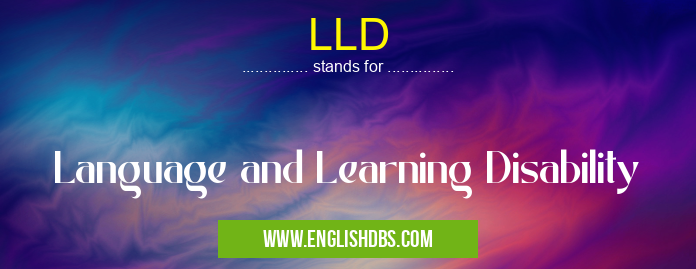What does LLD mean in LANGUAGE & LITERATURE
LLD is an acronym that stands for Language and Learning Disability. It refers to a group of disorders that affect a person's ability to comprehend, use, or produce language or engage in academic learning. These disabilities can range from mild to severe and can impact individuals of all ages.

LLD meaning in Language & Literature in Academic & Science
LLD mostly used in an acronym Language & Literature in Category Academic & Science that means Language and Learning Disability
Shorthand: LLD,
Full Form: Language and Learning Disability
For more information of "Language and Learning Disability", see the section below.
Causes of LLD
The exact causes of LLD are not fully understood, but it is believed to be a result of a combination of genetic and environmental factors. Some possible causes include:
- Genetic Predisposition: LLD can be inherited or passed down through families.
- Brain Differences: Individuals with LLD may have differences in the structure or function of the brain areas responsible for language and learning.
- Environmental Factors: Prenatal exposure to toxins, lead poisoning, and head injuries can increase the risk of LLD.
Types of LLD
LLD can manifest in various forms, including:
- Dyslexia: A difficulty with reading and decoding words.
- Dysgraphia: A difficulty with writing and spelling.
- Dyscalculia: A difficulty with math and numbers.
- Auditory Processing Disorder (APD): A difficulty with understanding spoken language.
- ADHD: A disorder characterized by difficulty paying attention, staying focused, and controlling behavior.
Symptoms of LLD
The symptoms of LLD can vary depending on the specific disorder and its severity. However, some common symptoms include:
- Language Difficulties:
- Difficulty understanding spoken or written language
- Difficulty expressing oneself clearly through speech or writing
- Learning Difficulties:
- Difficulty reading, writing, or spelling
- Difficulty with math or other academic subjects
- Attention and Behavior Problems:
- Difficulty paying attention or concentrating
- Hyperactivity or impulsivity
- Behavioral problems
Diagnosis of LLD
LLD is typically diagnosed by a team of professionals, including educational psychologists, speech-language pathologists, and occupational therapists. The diagnosis process involves a comprehensive evaluation that includes:
- Medical History: Reviewing the child's medical history to rule out any underlying medical conditions.
- Educational Assessment: Evaluating the child's academic strengths and weaknesses.
- Language Assessment: Assessing the child's language skills, including receptive and expressive language.
- Cognitive Assessment: Evaluating the child's cognitive abilities, including memory, attention, and problem-solving.
Treatment of LLD
There is no cure for LLD, but various treatments and interventions can help individuals manage their symptoms and improve their functioning. Common treatments include:
- Speech Therapy: To improve language skills and address speech difficulties.
- Occupational Therapy: To develop fine motor skills, coordination, and sensory processing.
- Educational Accommodations: Providing modified instruction, assistive technology, and other supports in school settings.
- Medication: In some cases, medication may be prescribed to manage attention deficit hyperactivity disorder (ADHD).
Essential Questions and Answers on Language and Learning Disability in "SCIENCE»LITERATURE"
What exactly is LLD?
Language and Learning Disability (LLD) is a neurodevelopmental disorder that affects a person's ability to acquire, understand, and use language. It can manifest in various forms, including difficulty with reading, writing, speaking, and listening comprehension.
What are the common types of LLD?
LLD encompasses a range of specific learning disabilities, such as dyslexia (difficulty with reading), dysgraphia (difficulty with writing), dyscalculia (difficulty with math), and auditory processing disorder (difficulty understanding spoken language).
What causes LLD?
The exact causes of LLD are still being researched, but it is believed to result from a combination of genetic and environmental factors. Certain genetic variations have been linked to language and learning difficulties, and environmental factors such as prenatal exposure to toxins and early childhood trauma can also contribute.
How is LLD diagnosed?
Diagnosis of LLD typically involves a multidisciplinary assessment by a team of professionals, including a psychologist, speech-language pathologist, and educational specialist. The assessment includes standardized tests, observations, and a review of the individual's developmental history and academic performance.
What are the treatments for LLD?
Treatment for LLD focuses on providing individualized support to address the specific needs of each individual. This may include specialized instruction in areas of difficulty, such as reading intervention or speech therapy. Other interventions may include assistive technology, accommodations in the classroom, and counseling or support groups.
Final Words: LLD is a complex set of disorders that can have a significant impact on a person's ability to communicate, learn, and function in everyday life. Early identification and diagnosis are crucial to ensure timely intervention and support. With appropriate treatment and accommodations, individuals with LLD can overcome challenges and lead fulfilling lives.
LLD also stands for: |
|
| All stands for LLD |
